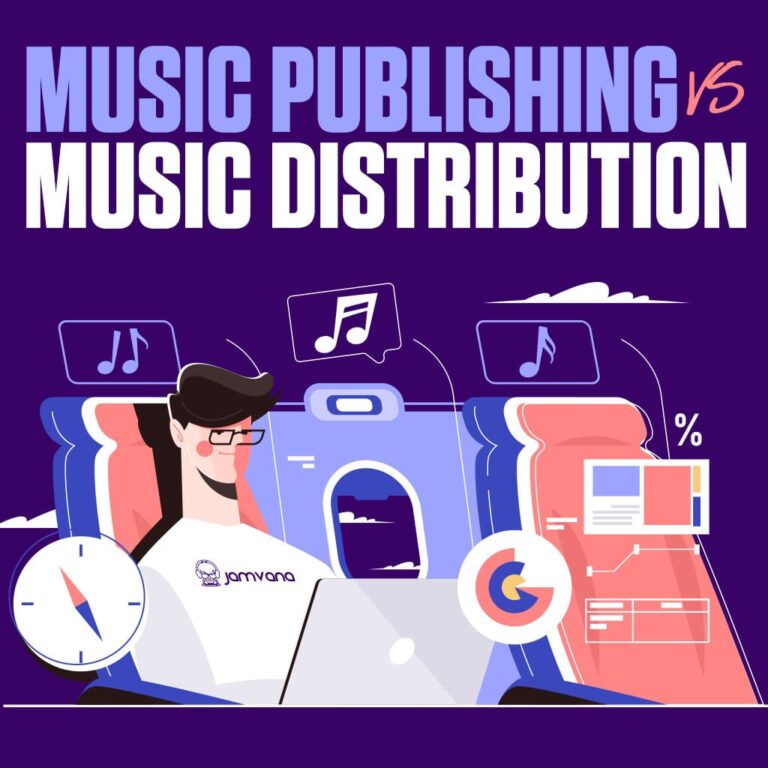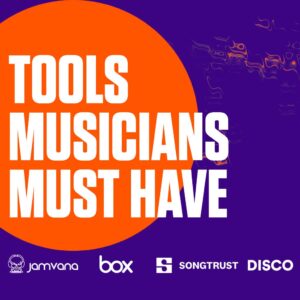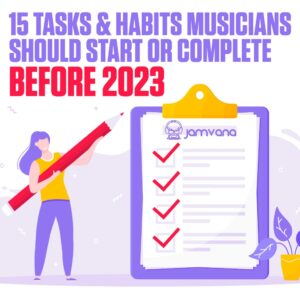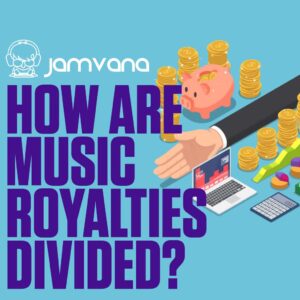Music distribution and music publishing are very different things, but they can easily be confused with one another.
The two are both very important when it comes to exposing music to the public. Music distribution is the process in getting your music to the streaming services (Spotify, Apple Music, TIDAL) as well as in physical form (CDs, vinyl), and music publishing is for exploiting compositions for additional revenue streams through fees and royalties.
In this post we’re going to explain the differences between music distribution and music publishing and why they both play such a critical role in music.
But before we dig in, we need to clarify a few small things (it won’t take long, I promise).
Two Types of Copyright in Music: Sound Recording and Composition/Lyrics
In music, there are two types of copyrights: one for the sound recording and one for the composition/lyrics.
The sound recording is the actual audio of the song. The composition/lyrics (song) are what is being recorded in the sound (audio) recording, like the notes, chords, melodies, and lyrics. And both can have the same or different copyright owner(s), but this is a different and extensive topic.
To keep it short: Typically, record labels own the sound recording and publishing companies own the composition/lyrics. An independent artist will own both, which is great because they’ll get more control and money!
Now that we’ve made this distinguished this, let’s feast on the meat and potatoes of this post.
What is music distribution?
Music distribution is the process artists, musicians, and record labels use to make their music publicly available on streaming services like Spotify, Apple Music, TIDAL, and Beatport, as well physical (CDs, vinyl). It’s worth noting that some music distributors don’t handle physical distribution.
Unlike SoundCloud, musicians will need what’s called a music distributor or aggregator to release their music on the streaming services. Spotify, Apple Music, TIDAL, and all the other services do not allow musicians to upload music directly to their platform. This is to ensure music is being uploaded and ingested into their system with the correct metadata and formatting. Imagine how messy Spotify and Apple Music would be if artists could upload music directly. Yikes!
These music distributors oftentimes have direct contracts with each streaming service they deliver to. Some are indirect with the streaming services and use a third-party service to white label their product. These contracts include several stipulations, including how much per stream the distributor will collect from the service provider. This information is typically hidden and not available to the public.
What companies are music distributors?
There are music distribution companies located all around the world. Each one offers a different set of features, and charges accordingly. Asking which music distributor is best is subjective. They all do similar things, so you simply have to find one within a price range and feature set that works for you.
The most common music distribution companies include:
- DistroKid
- TuneCore
- Jamvana
- CD Baby
- Amuse
- UnitedMasters
- RouteNote
- Symphonic Distribution
- Songtradr
There are certainly a lot more music distributors out there, and we recommend researching each of them to find one that works best for you.
Now let’s talk about music publishing.
What is music publishing?
Music publishing is the process songwriters use to make their musical compositions publicly available and monetized. A music publishing company is also responsible for collecting the royalties associated with those compositions, as well as promoting the songwriters for collaborations, public performances, and reproduction of their compositions.
There are three important royalties for music publishing:
- Mechanical royalties: This is a royalty paid to songwriters by other artists or companies that want to record, reproduce, and distribute their composition.
- Public performance royalties: This royalty is paid to songwriters anytime their composition is publicly performed.
- Synchronization fees: While not particularly a royalty, a synchronization fee is paid to the songwriter and/or their music publisher to use the composition in an audio-visual project (like a movie or TV show).
What companies collect music publishing royalties?
BMI, ASCAP, SESAC, Mechanical Licensing Collective (MLC), and Songtrust all collect one of the pillars of music publishing royalties. But none of them collect all of them (I wish!).
In the United States, BMI, SESAC, ASCAP are the performing rights organizations (PROs). They will collect public performance royalties. If you’re a songwriter, you’ll need to affiliate with one (and only one!) to collect your public performance royalties. One PRO isn’t necessarily better than the other. It’s simply a matter of preference and which one offers events and opportunities that suit your music.
The Mechanical Licensing Collective, or MLC, will collect the mechanical royalties that are paid by the streaming services through the blanket license they must obtain to list on their platform. The MLC is free to sign-up, and we recommend creating an account.
If you’re using Songtrust, you don’t need to sign up to the MLC. Songtrust already collects these mechanical royalties for you.
Lastly, for the synchronization fees, there is no company or organization that collects these. In the United States, the synchronization fees must be negotiated directly with the copyright owners for both the sound recording and publishing. As a songwriter, they’ll be paid directly to you and/or your publisher. This procedure is called “sync licensing,” and the fees are paid upfront by the licensor.
However, if, for example, that license is for an advertisement in an automotive company’s commercial, you will receive royalties every time that commercial is aired or publicly performed. Those royalties would be collected by your PRO.
All these details would be outlined in-depth in a contract, so it would be impossible to outline all or any scenario accurately within a blog post without seeing a contract.
Do music distributors collect mechanical royalties?
Typically, no, but some music distributors do have the capability to collect your mechanical royalties.
Your distributor’s primary purpose is to get the sound recordings delivered to the streaming services and collect some of the revenue earned on the streams of the sound recording. I say “some” because your distributor doesn’t collect all your sound recording’s royalties (Again, I wish!).
Conclusion
Music distribution and music publishing are vastly different and can often be confused with one another when discussing them. Music publishing is tied to the distribution of the sound recording because the lyrics and compositions are embedded into the recording.
Music publishing has different pillars of royalties and several organizations that will collect those royalties. The sound recording also has multiple companies that collect those royalties.
But now that you understand the two you won’t get them confused. If you do still have questions, comment below and we’ll answer them.






